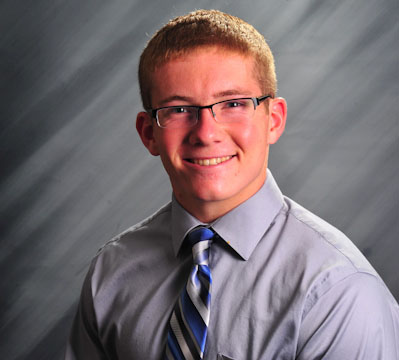Bringing high school students to the floor of the state Capitol
Prior to the beginning of my junior year of high school, if someone told me I was going to draft and present a proposal to state legislators in Lansing, I would have laughed.
I could see myself making a slideshow that outlines a modern day issue for my government class, but I couldn’t picture myself standing before a hearing committee, pitching an idea of my own creation, in hopes of inspiring state legislative action.
Before starting to work on the Michigan Student Caucus, my teacher informed my class at Howell High School that we could earn such an opportunity. I remember thinking to myself, “what could a representative possibly learn from some teenager?”
Fast forward a few months to December 2014, and I found myself walking up the steps of the capitol building in Lansing, proposal in hand. Up until I was given the floor to speak, all I had time to do was to be nervous and re-read my presentation for the ump-teenth time.
To my surprise, the presentation went great.
My proposal to provide funding for research on Psilocybin (an hallucinogen that has shown promise in easing distress in cancer patients) was well received. Since the compound had shown great promise in treating depression without harmful side effects and also aided long time smokers in seceding from their damaging habit, I felt compelled to bring it to the representatives’ attention.
Sitting before a semicircle of legislators, with University of Michigan and Howell High School students seated behind me, I found confidence when I began to deliver my proposal. Afterwards, my nervousness quickly became gratitude toward the caucus for the opportunity that I can only describe as the single proudest moment of my high school career.
The Michigan Student Caucus is a program, based at the University of Michigan School of Education, that allows students to debate and attempt to address real-world issues that affect students in Michigan and present these solutions to the Michigan Legislature.
Though there are countless idea-sharing spaces accessible to students, I have found many lack the right balance of guided discussions and student-led content that make the Michigan Student Caucus (MSC) unique. While U-M professors monitor and probe discussions to ensure they are in-depth, the content of the program is decided by the students.
Given that the participants are a mix of University of Michigan and high school students, the diversity guarantees a great diversity of perspectives. As long as an idea fits the direction of the program, participants have the ability to post whatever they would like, whether it be sharing an article, questioning restrictions on firearms, or attempting to open a dialogue on possible solutions to improving some of our struggling school systems. At its most basic, that is the goal of the caucus: students crafting real-world solutions to real-world problems facing Michigan.
As one would probably guess, none of us who presented proposals that day reached our positions without months of preparation. This past year, we spent many weeks pulling apart and analyzing a bill that removed local governmentś right to alter the minimum wage laws in their jurisdictions.
With anywhere from 130 to 200 students in the MSC each year, the continual stream of content makes it easy to find inspiration for one’s proposal. While some students are interested in helping to protect the safety of Michigan residents, others may be intrigued by our education system, leading to proposals ranging from increasing the monitoring of prescription drugs to establishing new requirements for computer science in our schools.
But the Caucus doesn’t end there; after proposals are completed and critiqued, they are then rated by the larger group of students. The 12 or so proposals that receive the most are presented before the House Commission on Civic Engagement in Lansing.
Luckily for me, I was not only a participant in the caucus, but one of the few that spoke in Lansing and the only high school student to earn a spot on the platform along with selected college students. While it was an honor, I can’t help but feel that the opportunity shouldn’t be as rare as it is for people of my age.
Students in the MSC are able to make a difference. Though legislation doesn’t directly come from the Caucus, ideas from the program have shown up in legislation, such as making a Minor in Possession alcohol charge a civil fine instead of a misdemeanor.
As a part of the Caucus and a part of Michigan’s population, I believe it’s important to find ways to keep students informed and involved in countless issues facing our society. To ensure that, more than a lucky few of us should get the opportunity to find a solution.
For further information on the Michigan Student Caucus, you can contact the University of Michigan Student Caucus faculty at mscinstructors@umich.edu or call 810.730.3814.
See what new members are saying about why they donated to Bridge Michigan:
- “In order for this information to be accurate and unbiased it must be underwritten by its readers, not by special interests.” - Larry S.
- “Not many other media sources report on the topics Bridge does.” - Susan B.
- “Your journalism is outstanding and rare these days.” - Mark S.
If you want to ensure the future of nonpartisan, nonprofit Michigan journalism, please become a member today. You, too, will be asked why you donated and maybe we'll feature your quote next time!


 Greg Kearns is a senior at Howell High School
Greg Kearns is a senior at Howell High School